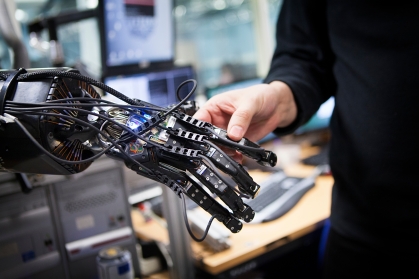Biomechanics and Biofabrication

Human biomechanics is a dynamic and growing field of study, in which Rutgers is at the forefront. Emerging technologies such as CAD and simulation software, 3D printing and related biofabrication methods, microfluidics, and nano- and molecular technologies are enabling revolutionary new solutions for restoring human mobility. We exploit these advances to extend the frontiers of knowledge and technology for the betterment of mankind. Our close collaboration with the Rutgers Medical School, hospitals, and clinics yields breakthroughs that are immediately relevant and translate into practical solutions for patients.
Rutgers BME has a track record of sustained research impact in areas that include spine and neurally active prostheses. "DextraHand", the world’s first multi-finger prosthesis, was developed here, as were artificial muscles as prosthetic actuators. Current research spans investigations into the mechanics of blood clots to the development of novel biomaterials that can be braided into ligaments or injected to replace cartilage. Additional work seeks to introduce vaccines and therapeutic genes into the body safely and effectively using mechanical suction (“cupping”).
Research Clusters
Cell and Tissue Mechanics
Associated Faculty: Joseph Freeman, Noshir Langrana, Adrian Mann, David Shreiber, Valerie Tutwiler
Microfluidic Mimics of Physiological Systems
Associated Faculty: Maribel Vazquez, Martin Yarmush, Jeffrey Zahn
Mechanisms of Acupuncture
Associated Faculty: Helen Buettner, David Shreiber, Valerie Tutwiler